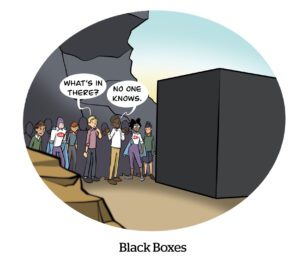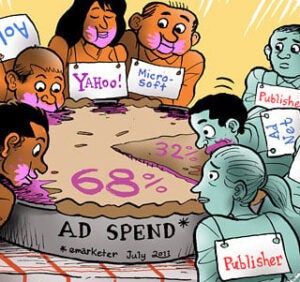Here’s today’s AdExchanger.com news round-up… Want it by email? Sign up here.
Pining For AI
Google laid off nearly 1,000 employees last week – but the hits keep coming. It’s also scrapping hundreds of jobs in its ad sales division, Business Insider reports.
The headcount reduction is a byproduct of restructuring its ad sales team, Chief Business Officer Philipp Schindler told employees in a memo on Tuesday.
But in Google’s case, “restructuring” is a euphemism for using AI.
The search engine giant is on a mission to automate as much of its advertising services as possible. One method is by growing products like Performance Max that use more first-party Google data and Google-owned media to outperform human ad buyers.
Which is why the layoffs are coming from ad sales this time. Humans are, unfortunately, less efficient than machines.
Similarly, Google once invested heavily in ad measurement services, buying the white-glove multitouch attribution company Adometry in 2014. But now reporting has mostly been automated via Google Analytics.
Ahead of the latest job cuts, Google’s leadership had a “candid conversation on our rapidly evolving business reality [and] the profound moment we’re in with AI,” Schindler’s memo reads.
So much for reassuring ourselves that robots won’t take our jobs.
The In-House Must
Years ago, the ad industry was seized by the ad tech in-housing trend.
With a few notable exceptions – Walmart, for example, acquired a shopper marketing agency (Triad Retail Media), an ad server (Thunder) and an SSP (Polymorph Labs) – brands mostly decided against operating ad tech.
However, marketers are now taking the reins to control their ad tech contracts.
“The in-housing of contracts is mainly so the brand has data rights,” Tom Triscari, founder of programmatic consultancy Lemonade Projects, tells Adweek. “[Brands] want access to the data so [they] can make better media decisions.”
For marketers, getting access to their own data – or what they consider to be their own data – can be trickier than expected.
Consider Part Two of the ANA’s blockbuster programmatic transparency report, released late last year, which shined an unflattering light on inefficient supply paths and low-quality media. Although the report featured large brands, relatively few advertisers were directly involved.
The ANA had 67 advertisers interested in participating, ANA EVP Bill Duggan told AdExchanger at the time. But only 21 were able to get the necessary data – which is to say, their own log files – from ad tech vendors and agency partners. Why? Turns out they didn’t have the contractual rights.
End Of An Epic Trial?
The Supreme Court rejected the appeal filed by Epic Games in its antitrust case against Apple, The Verge reports.
In 2020, Fortnite publisher Epic accused Apple of stifling competition by forcing developers to use its in-app payment system and give it a 30% cut of in-app or subscription revenue. The Apple App Store booted Epic for promoting its own in-app payment platform.
Epic sought to force Apple to readmit its games, allow third-party app stores to “side-load” on Apple devices and allow developers to publicize alternative payment options.
But a California judge ruled that Apple’s preference for its in-app payment system wasn’t anti-competitive and held Fortnite liable for violating its terms with Apple. However, the same judge ruled that Apple must allow developers to promote their in-app payment platforms.
With the Supreme Court declining to review the California verdict, the antitrust case seems to have worked out in Apple’s favor. “The court battle to open iOS to competing stores and payments is lost in the United States,” Epic CEO Tim Sweeney posted on X.
How these decisions will impact the appeals process for a similar case brought by Epic, in which a jury found Google does operate an anti-competitive app store, remains to be seen.
But Wait, There’s More!
Red Ventures is exploring a sale of CNET and would be happy with half the $500 million it paid for the company in 2020. [Axios]
Here’s what The Trade Desk actually thinks about Google’s Privacy Sandbox. [Digiday]
Snap’s sleeper hit subscription service, Snapchat+, must balance its growth opportunity with the mental health of its users. [The Information]
Google Search really has gotten worse, researchers find. [404 Media]
The incredible shrinking podcast industry. [Semafor]
Out-of-home billboards, coming to semi-trucks near you. [release]
Indeed launches Specialist Media Networks for targeted job listings on third-party sites. [release]
You’re Hired!
DeepIntent names Lisa Kopp Johnson as CRO and Adam Kapel as CMO. [release]
Doceree expands its leadership in North America with ad tech and agency veterans, including former DeepIntent exec Marcella Milliet Sciorra as CMO. [release]

















